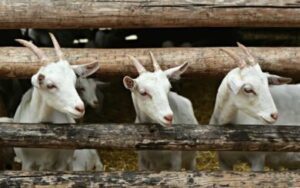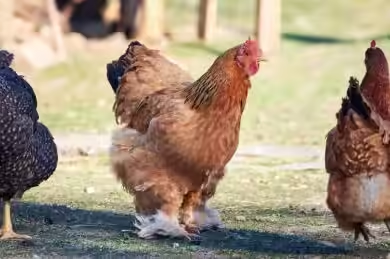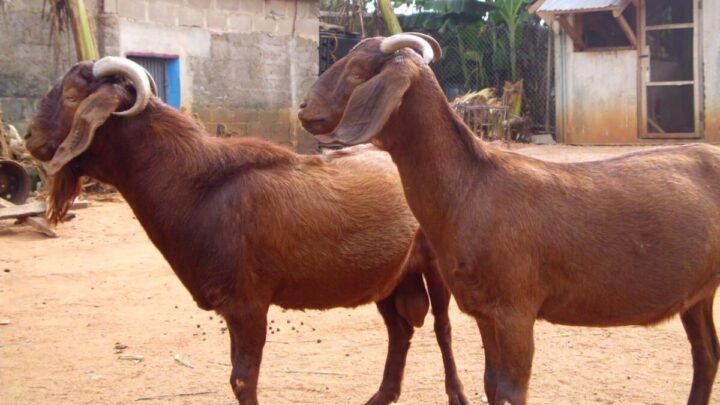Last updated on August 15, 2025
Starting a goat farming business in Nigeria is one of the smartest moves you can make if you’re looking for a steady income and a business that’s as rewarding as it is profitable. Whether you’re a seasoned farmer or just starting out, goat farming offers a unique opportunity to tap into an ever-growing market for goat meat, milk, food security, and more. But where do you begin? That’s where I come in. In this article, I’ll guide you step-by-step on how to start your goat farming business, from planning and choosing the right breed, to managing your farm and scaling it to success. Stick around, because by the end of this article, you’ll be ready to kick off your own goat farming venture!
While goat farming is incredibly rewarding, it’s wise to understand how it compares to other small ruminants. For a detailed analysis, see our guide on sheep vs. goats and which is more profitable for a small farm.
Why Goat Farming in Nigeria? Here’s Why It’s a Winning Business
Before jumping into the “how” of goat rearing in Nigeria, let’s talk about the “why.” Why should you even consider goat farming in Nigeria? The answer is simple: it’s a growing industry with huge potential, and it fits perfectly within the Nigerian agricultural landscape.



High Demand for Goat Meat and Milk
First off, goat meat, also known as “chevon” or “mutton,” is in high demand across Nigeria. It’s a favorite in local dishes like pepper soup, suya, and stews, making it a reliable source of income and provide food security. But it’s not just the meat that people want. Goat milk is increasingly being recognized for its health benefits, like being easier to digest than cow’s milk, and it’s used in various products, including soaps and cosmetics. There’s an expanding market for both.
Low Initial Investment
Unlike cattle or poultry farming, starting a goat farm doesn’t break the bank. You don’t need to spend a fortune on specialized equipment or feed. With a bit of land, a few goats, and some basic infrastructure, you can get started. Goat farming is also less labor-intensive than other livestock businesses, which means fewer headaches and more time to focus on growing your business.
Sustainable Income Source
Goat farming can provide a consistent income, especially if you breed your goats and manage your herd well. You can sell meat, milk, and even by-products like skin and manure. Plus, goats reproduce quickly, so you can scale your farm over time as your business grows.
How Much Does It Cost to Start a Goat Rearing in Nigeria?
One of the most common concerns is start-up costs, and for good reason! Nobody wants to dive into a business blind. The truth is, goat farming can be as low-budget or as high-scale as you want. Here’s a breakdown of potential expenses to give you a clearer picture:



1. Land Costs
The cost of land depends on your location:
- Rural areas: Land is more affordable, with prices ranging from ₦50,000–₦150,000 per hectare annually.
- Urban outskirts: More expensive, but offers easier market access.
For a small farm, one to two hectares is enough. However, larger farms might require five or more hectares for proper grazing and housing.
2. Cost of Goats
The price of goats varies depending on the breed and age:
- West African Dwarf goats: ₦10,000–₦20,000 each.
- Sokoto Red goats: ₦20,000–₦40,000.
- Boer goats (imported): ₦50,000–₦100,000.
A starter herd of 10 goats could cost anywhere between ₦150,000 and ₦400,000. If you’re planning for milk production, focus on high-yield milk breeds.



3. Housing and Fencing
Goats don’t need luxury housing, but they do need a clean, dry, and predator-proof shelter. Building a basic goat house costs between ₦50,000 and ₦200,000, depending on size and materials. Fencing is equally important to keep your goats secure. Barbed wire or mesh fencing could add ₦20,000–₦50,000 to your budget.
4. Feeding and Healthcare
Goats are low-maintenance eaters, but you’ll need a mix of grazing and supplementary feeding. Here’s what to expect:
- Feeding: ₦2,000–₦5,000 per goat monthly.
- Healthcare (vaccinations, deworming): ₦10,000–₦15,000 per quarter.
Starting small, with 10–20 goats, will typically cost ₦300,000–₦500,000. For larger operations, budget upwards of ₦1,000,000.
How To Start Goat Farming Business In Nigeria: A Step-By-Step Guide
Step 1: Planning Your Goat Farming Business
Before you start buying goats, you need a solid plan. Think of this as your business blueprint. A good business plan not only guides you but also helps you navigate challenges and track progress.




Choosing the Right Breed
Selecting the right breed is one of the first and most important decisions. There are several goat breeds in Nigeria, each with its strengths, and picking the right one will determine the success of your farming operation.
Popular Goat Breeds in Nigeria
- West African Dwarf (WAD): This breed is hardy, disease-resistant, and well-suited for Nigeria’s tropical climate. It’s also relatively small, making it a good choice for small-scale farming.
- Boer Goat: Known for its impressive size and rapid growth, the Boer goat is a meat breed that’s highly sought after for its tender, high-quality meat.
- Sokoto Red: If you’re interested in dairy or leather products, the Sokoto Red is a good choice. It’s great for both milk production and skin quality.
Choosing the Best Breed for Your Farm
When deciding which breed to go for, consider your farm’s purpose. Are you more interested in meat, milk, or both? Are you farming for personal use or for profit? Also, think about climate and terrain—certain breeds thrive better in specific environments, so make sure to pick one that suits your farm’s location.
Developing a Business Plan
A business plan is more than just numbers. It’s about setting goals, identifying potential problems, and laying down the steps to succeed. Here are some key things to include:
- Budgeting and Financial Planning: How much capital do you need to start? This includes the cost of land, infrastructure (shelters, feed storage), goats, and veterinary care. Don’t forget about your operational costs, like feed and medication.
- Target Market: Who are you selling to? Will you sell directly to consumers, local restaurants, or even consider exporting? Identifying your market helps you decide how to produce and market your products.
Step 2: Setting Up Your Goat Farm
Once you have your plan in place, it’s time to set up your farm. This includes securing land, building shelters, and creating a healthy environment for your goats.




Securing Land for Goat Farming
When choosing land, think about your goats’ needs. They need space to roam, graze, and reproduce. A minimum of one hectare is ideal for a small-scale farm.
Choosing the Right Location
- Climate: Goats are tough animals, but they do better in places with good rainfall and grassy land.
- Access to Water: Goats need a steady supply of clean water, so make sure your farm is close to a water source or has a reliable system in place.
Soil and Vegetation
Goats are natural foragers and will thrive on a mix of grass, shrubs, and leaves. Ensure your land has good vegetation to provide for their dietary needs, reducing the cost of buying feed.
Building Goat Shelters
Your goats need shelter to protect them from the sun, rain, and wind. But it doesn’t need to be fancy. A simple, well-ventilated structure with raised floors will do the job.
Goat Housing Considerations
- Size: Each goat needs around 1.5 to 2 square meters of space. Make sure there’s enough room for them to move around and lie down comfortably.
- Ventilation: Proper airflow is crucial to prevent respiratory diseases. Keep the shelter clean and dry to minimize the risk of infection.
Step 3: Caring for Your Goats
Once you’ve got your land and shelter set up, it’s time to focus on keeping your goats healthy. Healthy goats are happy goats, and happy goats are profitable goats.




Feeding and Nutrition
Goats are herbivores and best suited to grass grazing, but a balanced diet is key to their health and productivity.
Types of Goat Feed
- Pasture: Goats will happily graze on pasture, but it’s not always enough to meet their nutritional needs.
- Concentrates: Grains, legumes, and other high-energy feed can supplement their diet, especially if they’re lactating or pregnant.
- Mineral Supplements: Goats need minerals like calcium, phosphorus, and salt for strong bones and overall health. Providing mineral blocks or mixed feed is essential.
Health and Veterinary Care
Goats are relatively low-maintenance animals, but they do need regular care to stay healthy.
Common Diseases and Prevention
- PPR (Peste des Petits Ruminants): This is a highly contagious disease that can decimate your herd. Vaccinate your goats regularly to protect them.
- Foot Rot: Make sure your goats have clean, dry feet, as wet conditions can lead to this painful condition.
Regular Vet Check-Ups
Establish a relationship with a local veterinarian and schedule regular check-ups for your goats. Prevention is always better than cure, and your vet will help you stay on top of any health issues.
Step 4: Marketing and Selling Your Products
Marketing is the bridge between your farm and your customers. Without a solid marketing strategy, even the best goat farm can struggle to succeed. The good news? You don’t need a huge budget or fancy tools to effectively market your products. Here’s how to get started:





1. Understand Your Market
Before you go into marketing, take a moment to understand who your customers are. Are they consumers looking for fresh goat meat or people seeking goat milk? Maybe they’re other farmers interested in buying breeding stock or kids. Understanding your target market will help you shape your sales approach.
- Local Markets: In Nigeria, markets are a huge part of buying and selling. You can find local buyers by setting up a stall at the market. Farmers often sell live goats to butchers or local consumers directly.
- Online Platforms: Social media is an easy and cost-effective way to promote your farm. Facebook, Instagram, and WhatsApp are especially popular for farm-to-table sales. Post high-quality photos of your goats and their healthy living conditions and share customer testimonials.
- Word of Mouth: Trust me, one happy customer can lead to several others. Offering top-notch customer service and delivering on your promises (like consistently healthy goats or fresh milk) will generate repeat business and referrals.
2. Diversify Your Sales Channels
It’s important not to put all your eggs in one basket. That means exploring different ways to sell your products.
- Goat Meat: If you’re raising goats for meat, you can target butcher shops, restaurants, or local supermarkets. Some farmers even set up partnerships with processors to sell packaged goat meat.
- Goat Milk: Fresh goat milk has a growing demand, especially among people looking for lactose-free alternatives. Explore selling to local dairies or even processing it into cheese or yogurt.
- Goat Breeding Stock: Selling healthy, high-quality breeding goats can be a lucrative venture. Many farmers in Nigeria are willing to pay a premium for top-tier stock. You can advertise through farming groups or breed-specific associations.
3. Offer Value-Added Products
To increase revenue, you can also consider diversifying your product line with value-added products like:
- Goat Milk Soap: Known for its skin-friendly properties, goat milk soap is in high demand.
- Cheese: Goat cheese is a popular delicacy in many markets.
- Manure: Don’t forget about goat manure! It’s excellent for fertilizer and can be sold to gardeners or farmers.
4. Build Relationships with Your Customers
Whether you’re selling goats, milk, or meat, building strong relationships with your customers is key to long-term success. Offer great customer service, keep them informed about new products, and follow up after sales. A loyal customer base is priceless in this business!




Step 6: Financial Management Practices
Successful farming isn’t just about producing healthy goats; it’s also about managing the finances. Effective financial management practices is what will keep your farm running smoothly and profitably. Let’s take a look at how to manage your goat farming finances:
1. Set a Budget
Start by setting a realistic budget for your farm’s operation. This budget should cover:
- Start-up costs: Land, goats, housing, fencing, etc.
- Operating costs: Feed, veterinary care, transportation, and utilities.
- Unexpected costs: Emergencies like goat illnesses, accidents, or market fluctuations.
Having a budget allows you to track your expenses and avoid overspending.
2. Keep Track of Your Expenses and Income
To stay profitable, it’s crucial to keep detailed records. Use a simple spreadsheet to track:
- Income: What you earn from selling goats, milk, or other products.
- Expenses: Feed, health care, labor, utilities, and other operational costs.
Review your financials regularly to identify patterns. Are you spending too much on feed? Is there a seasonal fluctuation in milk production? Adjust your operations as needed.
3. Plan for the Future
Think ahead! A good financial plan includes:
- Expansion: How will you scale your farm? Do you plan to increase the number of goats or diversify into new products?
- Emergency fund: Save a portion of your profits for emergencies like animal disease outbreaks, natural disasters, or market downturns.
- Profit reinvestment: Use part of your profits to reinvest in your business—whether that’s upgrading your farm facilities, buying new equipment, or expanding your herd.
Effective financial management will ensure your farm stays profitable, sustainable, and resilient.
Step 7: Scaling Your Business
Once your goats are thriving, it’s time to think about growing your business. Whether it’s breeding more goats, expanding your farm, or reaching new markets, the sky’s the limit!
Breeding Practices
Breeding is the key to increasing your herd and ensuring a steady supply of goats. You can either use natural breeding methods or opt for artificial insemination to improve the genetic quality of your herd.
Step 8: Stay Informed and Adapt
Farming is a dynamic field. Markets, climates, and customer needs change. To stay successful in the long run, you’ll need to stay informed and adapt to new challenges and opportunities.
1. Continuously Educate Yourself
The agricultural venture world is constantly evolving, with new techniques, technologies, and best practices emerging regularly. Attend farming workshops, online webinars, or local agricultural meetings to stay updated on trends.
- Veterinary knowledge: Learn more about animal health, common diseases in goats, and ways to prevent them.
- New feed options: Research and experiment with new, cost-effective feeds that can improve your goats’ productivity.
- Farming technology: Technology like automated feeding systems, health tracking apps, and weather forecasting tools can make your farm more efficient.
2. Monitor Market Trends
The demand for goat products, especially goat meat and milk, can fluctuate based on seasons, holidays, and market trends. Stay informed about local and global trends by subscribing to farming newsletters or joining farming associations.
For example, there might be a surge in demand for goat meat during festive seasons, such as Christmas or Eid. If you plan ahead, you can capitalize on these opportunities to maximize profits.
3. Be Open to Adaptation
Flexibility is key in farming. If a particular breed of goat isn’t thriving on your farm or a certain product isn’t selling as well as you hoped, don’t be afraid to change course. Experiment with new breeds, different farming practices, or alternative products.
A successful goat farming business is all about learning and adapting over time. Don’t hesitate to make adjustments if something isn’t working or if there’s a better way to do things.
4. Network with Other Farmers
Networking with fellow goat farmers can be incredibly valuable. Share experiences, discuss challenges, and exchange tips on everything from breeding to marketing. You might even find potential business partners or buyers.
Online farming forums, local agricultural venture groups, and social media are great places to start building relationships with other farmers.
What is the Best Feed for Goats in Nigeria?
Feeding goats might seem simple—they’ll eat just about anything, right? But if you want healthy, productive goats, you need to get their diet right. Here’s what works best in Nigeria:
1. Grazing and Foraging
Letting goats graze on fresh grass and shrubs is natural and cost-effective. Trees like moringa and neem are great for their nutritional value.
2. Hay and Silage
These preserved feeds are lifesavers during the dry season when pasture isn’t available.
3. Concentrates
Adding maize, wheat bran, or soybean meal can help your goats grow faster and produce more milk.
4. Minerals and Water
Don’t forget to provide salt licks and clean water daily. Dehydration and mineral deficiencies can quickly harm your goats.
How Many Months Does It Take a Goat to Mature?
Most goats mature between 6 and 12 months, but it depends on the breed and feeding. Here’s a quick breakdown:
- Meat goats (e.g., Boer): Ready for slaughter in 6–8 months.
- Milk goats (e.g., Nigerian Dwarfs): Reach full production potential by 9–12 months.
Investing in proper nutrition and care can shave months off their growth cycle.
How Profitable is a Goat Farm?
Here’s the exciting part: goat farming is highly profitable if managed well. Let’s break it down:
Revenue Streams
- Meat: Goat meat sells for ₦1,500–₦3,000 per kilogram, and a single goat can bring ₦15,000–₦40,000.
- Milk: Fresh goat milk goes for ₦300–₦500 per liter. A productive goat can provide up to 2 liters daily.
- Breeding stock: High-quality kids fetch premium prices, especially among other farmers.
Profit Margins
Well-run farms can achieve profit margins of 25–50% annually. Your success depends on efficient feeding, low mortality rates, and consistent marketing.
Which Trees Are Best for Goats?
Planting the right trees not only feeds your goats but also saves money on feed. Top choices include:
- Moringa: High in protein and easy to grow.
- Neem: Boosts immunity and health.
- Leucaena and Gliricidia: Fast-growing, high-protein fodder trees.
Conclusion
Starting a goat farming business in Nigeria is a fantastic opportunity, especially when you have a clear plan and a passion for what you’re doing. From choosing the right breed and setting up your farm to caring for your goats and scaling your business, every step is essential for long-term success. So, are you ready to take the plunge? Start your goat farming journey today!
For farmers seeking an even lower startup cost and faster reproductive cycle than goats, profitable rabbit farming and Piggery farming is an excellent alternative to explore.
FAQs
1. What is the best breed for goat farming in Nigeria?
The West African Dwarf, Boer, and Sokoto Red are excellent choices based on your farm’s needs.
2. How much capital do I need to start a goat farming business?
Starting a small goat farm could cost between ₦100,000 to ₦300,000, depending on your setup.
3. What are the common challenges in goat farming?
Diseases, feed shortages, and fluctuating prices can be challenges, but with good planning, they’re manageable.
4. How long does it take to start making a profit?
Typically, you can start seeing profits within 12-18 months, depending on your investment and management practices.
5. Can goat farming be combined with other agricultural practices?
Yes! Goats can complement other crops or livestock, like chickens or vegetables, for better farm sustainability.
Goat Farming Profitability Calculator
Estimate your potential annual profit and return on investment for your goat farming business in Nigeria.
Farm & Herd Details
Different breeds have varying costs, meat/milk yields, and growth rates.
This affects which revenue streams are prioritized in calculations.
For land cost calculation. Enter 0 if land is already owned/no direct annual cost.
Percentage of goats expected to be lost annually due to disease, etc.
Initial & Annual Cost Estimates (₦)
WAD: ₦10-20k, Sokoto Red: ₦20-40k, Boer: ₦50-100k.
Basic shelter: ₦50-200k. Fencing: ₦20-50k.
Rural areas: ₦50-150k per hectare annually.
₦2,000-₦5,000 per goat monthly (₦24k-₦60k annually).
Includes vaccinations, deworming.
Cost for farmhands, if any. Enter 0 if you manage it yourself.
Contingency, small repairs, etc.
Annual Revenue Estimates (₦)
Estimated live weight for meat production.
Typical: ₦1,500-₦3,000 per kg.
Assumes 50% of initial herd are does, and this percentage are lactating.
Productive goats can yield up to 2 liters daily.
Typical: ₦300-₦500 per liter.
Assumes 50% of initial herd are does, and this percentage are breeding.
Goats reproduce quickly, often 2-3 kids per year.
High-quality kids fetch premium prices.
Annual Profitability Summary
Overall Profitability Level
These estimates are based on average market prices and input costs. Actual profitability can vary significantly by location, specific practices, and market fluctuations.


